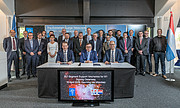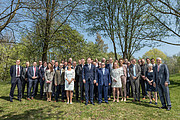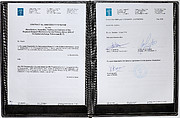Anuncio
Se firma contrato para soportes de segmentos del espejo primario del ELT
19 de Abril de 2018
ESO ha firmado un contrato con VDL ETG Projects B.V. (Países Bajos) para la fabricación, ensamblaje, puesta a prueba y entrega de la mecánica de soporte de segmentos del espejo primario del Extremely Large Telescope de ESO. Los soportes de segmentos unidos actúan como la columna vertebral del espejo primario sosteniendo los 798 segmentos en su lugar. Sensores y actuadores controlan y monitorean la forma y posición de cada segmento a una alta precisión.
El contrato fue firmado por Harrie Schonewille, Director Ejecutivo de VDL ETG Projects, Willem van der Leegte, Presidente de VDL y Xavier Barcons, Director General de ESO, en una ceremonia realizada el 19 de abril de 2018, en la Sede Central de ESO en Garching, Alemania.
Cuando se haya completado, el espejo primario (M1) del ELT tendrá un diámetro de 39 metros y consistirá en 798 segmentos hexagonales. La forma hexagonal permite el uso de una estructura de soporte común para todos los segmentos. Cada segmento estará conectado a la estructura central mediante un sistema de soporte de segmentos. Éste se compone de tres mecanismos de conexión que balancean la fuerza ejercida y sostienen el segmento mediante 27 actuadores axiales y un actuador lateral. La forma de cada segmento puede ser optimizada mediante actuadores de arnés de deformación. Cada segmento de 1.4 metros de diámetro y 250 Kgs de peso será montado sobre tres actuadores de posición.
La primera luz del ELT está prevista para el 2024, cuando abordará los mayores desafíos de nuestra era. Se espera que el telescopio gigante permitirá la exploración de regiones completamente desconocidas del Universo, y llegará a ser el “ojo más grande del mundo para mirar el cielo”.
Contactos
Marc Cayrel
ESOGarching bei München, Alemania
Tel: +49 89 3200 6685
Correo electrónico: mcayrel@eso.org
Richard Hook
Encargado de Prensa de ESO
Garching bei München, Alemania
Tel: +49 89 3200 6655
Celular: +49 151 1537 3591
Correo electrónico: rhook@eso.org
Sobre el anuncio
| Identificador: | ann18028 |
Our use of Cookies
We use cookies that are essential for accessing our websites and using our services. We also use cookies to analyse, measure and improve our websites’ performance, to enable content sharing via social media and to display media content hosted on third-party platforms.
ESO Cookies Policy
The European Organisation for Astronomical Research in the Southern Hemisphere (ESO) is the pre-eminent intergovernmental science and technology organisation in astronomy. It carries out an ambitious programme focused on the design, construction and operation of powerful ground-based observing facilities for astronomy.
This Cookies Policy is intended to provide clarity by outlining the cookies used on the ESO public websites, their functions, the options you have for controlling them, and the ways you can contact us for additional details.
What are cookies?
Cookies are small pieces of data stored on your device by websites you visit. They serve various purposes, such as remembering login credentials and preferences and enhance your browsing experience.
Categories of cookies we use
Essential cookies (always active): These cookies are strictly necessary for the proper functioning of our website. Without these cookies, the website cannot operate correctly, and certain services, such as logging in or accessing secure areas, may not be available; because they are essential for the website’s operation, they cannot be disabled.
Functional Cookies: These cookies enhance your browsing experience by enabling additional features and personalization, such as remembering your preferences and settings. While not strictly necessary for the website to function, they improve usability and convenience; these cookies are only placed if you provide your consent.
Analytics cookies: These cookies collect information about how visitors interact with our website, such as which pages are visited most often and how users navigate the site. This data helps us improve website performance, optimize content, and enhance the user experience; these cookies are only placed if you provide your consent. We use the following analytics cookies.
Matomo Cookies:
This website uses Matomo (formerly Piwik), an open source software which enables the statistical analysis of website visits. Matomo uses cookies (text files) which are saved on your computer and which allow us to analyze how you use our website. The website user information generated by the cookies will only be saved on the servers of our IT Department. We use this information to analyze www.eso.org visits and to prepare reports on website activities. These data will not be disclosed to third parties.
On behalf of ESO, Matomo will use this information for the purpose of evaluating your use of the website, compiling reports on website activity and providing other services relating to website activity and internet usage.
Matomo cookies settings:
Additional Third-party cookies on ESO websites: some of our pages display content from external providers, e.g. YouTube.
Such third-party services are outside of ESO control and may, at any time, change their terms of service, use of cookies, etc.
YouTube: Some videos on the ESO website are embedded from ESO’s official YouTube channel. We have enabled YouTube’s privacy-enhanced mode, meaning that no cookies are set unless the user actively clicks on the video to play it. Additionally, in this mode, YouTube does not store any personally identifiable cookie data for embedded video playbacks. For more details, please refer to YouTube’s embedding videos information page.
Cookies can also be classified based on the following elements.
Regarding the domain, there are:
- First-party cookies, set by the website you are currently visiting. They are stored by the same domain that you are browsing and are used to enhance your experience on that site;
- Third-party cookies, set by a domain other than the one you are currently visiting.
As for their duration, cookies can be:
- Browser-session cookies, which are deleted when the user closes the browser;
- Stored cookies, which stay on the user's device for a predetermined period of time.
How to manage cookies
Cookie settings: You can modify your cookie choices for the ESO webpages at any time by clicking on the link Cookie settings at the bottom of any page.
In your browser: If you wish to delete cookies or instruct your browser to delete or block cookies by default, please visit the help pages of your browser:
Please be aware that if you delete or decline cookies, certain functionalities of our website may be not be available and your browsing experience may be affected.
You can set most browsers to prevent any cookies being placed on your device, but you may then have to manually adjust some preferences every time you visit a site/page. And some services and functionalities may not work properly at all (e.g. profile logging-in, shop check out).
Updates to the ESO Cookies Policy
The ESO Cookies Policy may be subject to future updates, which will be made available on this page.
Additional information
For any queries related to cookies, please contact: pdprATesoDOTorg.
As ESO public webpages are managed by our Department of Communication, your questions will be dealt with the support of the said Department.




